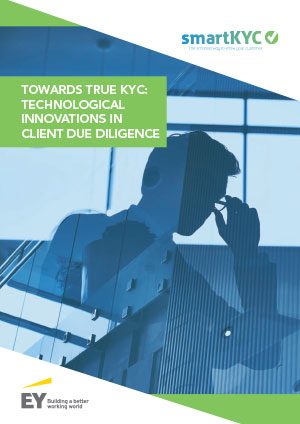WM Market Reports
Towards True KYC: Technological Innovations in Client Due Diligence

There are worrying gaps in the practices used by wealth managers to screen clients, new research from this news organisation shows.
Resourcing challenges – both human and technological – are
exposing wealth managers to grave dangers on the KYC/AML and
sanctions screening front, according to new research by
WealthBriefing being unveiled at today’s inaugural
FinTech Conference presented by sister publication Family
Wealth Report.
Towards True KYC: Technological Innovations in Client Due
Diligence is based on a survey of wealth management
professionals in the UK, EU, Switzerland, Hong Kong, Singapore
and US, with the findings illuminated by in-depth interviews with
20 senior wealth management executives, compliance and technology
experts, lawyers and consultants.
The report continues WealthBriefing’s investigations
into client onboarding procedures, and here again significant
gaps emerged between what technology-enabled best practice ought
to be and what many wealth managers are currently able to do on
this front. It is worrying, for example, that in to¬day’s
fast-moving environment almost a fifth of firms are fully
rescreening high-risk clients only once a year, while at the
other end of the spectrum a similar proportion are doing this
daily. The good news, however, is that ameliorative action
appears to be afoot across the majority of firms.
The report, which was produced in conjunction with EY and
technology provider smartKYC, found that almost two-thirds (63%)
of wealth managers will increase their CDD spend in the next
year, with a third maintaining current levels and just 4 per cent
predicting a fall. Of those increasing their budgets, just over a
tenth (11 per cent) will focus on outsourcing, such as employing
third-party specialists to compile client reports. The majority,
however, were evenly split (44 per cent each) between those
focused predominantly on recruiting more staff and those
investing in technology.
The war for talent has seen remuneration levels in compliance
soar, with wage inflation often far outstripping that for
revenue-generating staff in fast-growing wealth management
centres; even in mature jurisdictions specialists might expect to
achieve salary jumps of 20-30 per cent with each new role. As one
of the contributors said, it is rapidly becoming “prohibitive to
hire”, and just as with other areas of compliance, wealth
managers are increasingly turning to new technologies as
something of a saviour in response.
As part of examining CDD procedures in the round, the report
assesses the biggest pain points facing firms, finding that the
challenges of documenting source of wealth/funds and PEP
screening are weighing most heavily on the industry. These were
tied with 29 per cent of the votes each and the many challenges
coming under their auspices merits their clear lead. Yet issues
around data capture and document collation (17 per cent), and
detriment caused to the client experience/relationship (11 per
cent) – particularly because of data security concerns – are also
high on the agenda.
As the expert commentators pointed out, we can also expect
difficulties around identifying Ultimate Beneficial Owners to
rise as regulations forcing greater transparency in this area -
like MLD IV - come into force. Here, recent developments with
Iran are a perfect illustration of how the nexus between
regulation and rapid shifts in geopolitics may present immense
CDD challenges.
In the words of its president, Hassan Rouhani, Iran has opened a
“new chapter” after the easing of international sanctions imposed
by the West. These have been a major compliance headache for
wealth managers, with multi-billion dollar fines for breaches
having been meted out in recent years. While Iran’s young and
growing population certainly makes it an interesting market for
wealth managers, commentators have warned that serious issues
remain. We should not forget that there are substantial, ongoing
US sanctions against Iran and entities situated there, and
against using the US dollar in commerce with Iran.
Pertinent to this report’s findings, there may also be
significant challenges in ascertaining the beneficial owners of
Iranian entities due to the fact that many business¬es operate as
“bonyads” – tax-advantaged, quasi-governmental bodies with little
trans¬parency. Crucially, the easing of sanctions does not
include entities owned or controlled by the Iranian Revolutionary
Guards Corps, said to control up to a third of the country’s
economy. Safely writing Iranian business will clearly require
wealth managers to have extremely robust controls in place.
Having the capabilities to carry out thoroughgoing media searches
will be invaluable in carrying out due diligence to the necessary
standards, for example.
The overwhelming message to come out of the report is that in
client screening matters manual often means minimalist by
necessity, and that by not having modern tools in place firms are
missing out on both commercial and risk mitigation opportunities.
Previous WealthBriefing research has shown that wealth managers
are increasingly seeking wide-ranging business benefits from
their compliance efforts. With the technological innovations
described in this report, firms are already seeing great results
from their investments on this front.
Towards True KYC: Technological Innovations in Client Due
Diligence is free to access as part of WealthBriefing member
benefits; to view/download your copy please fill out the form
below.